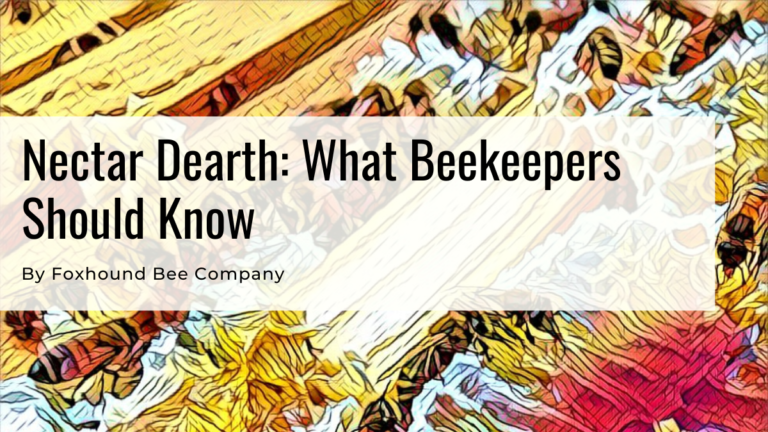Table of Contents
Have you heard about Apimondia? It’s not just a conference; it’s a major beekeeping conference/congress that attracts visitors from across the globe.
Every two years, this global gathering brings together bee enthusiasts of all levels—from the weekend hobbyist to the seasoned professional.
Officially, the event is organized by the International Federation of Beekeepers and it is called a Congress instead of conference.
It’s been on our bucket list to go to for years because it is the only conference that brings people from all over the world to it, no matter where it is.
Apimondia is all about collaboration, education, and community. The global beekeeping community that is. Whether you’re interested in the latest methods of sustainable beekeeping, tackling common hive diseases, or exploring new technologies, this congress has something to offer. The expo is really one of a kind.
With a rich blend of workshops, vendors, lectures, and networking opportunities, Apimondia provides a space for beekeepers to learn, share, and grow together. Seriously, it pulls people from every continent where people keep bees. Maybe one day people will keep bees on Antarctica. Bees have been in space already.
If you’re in the beekeeping field or just passionate about the world of bees, consider making a trip to Apimondia. If you can spring the travel and the conference fees, it’s worth it.
Where Is The Apimondia Congress?
Apimondia’s conference location rotates among different host cities around the world, reflecting the global nature of beekeeping. The choice of host city is a careful decision, often involving a competitive bidding process where cities present their capabilities and vision for the event.
When I first heard of Apimondia, it was in Canada and thought I would wait until it become closer. Little did I know that it was in Russia, Turkey and Chile in the following years. So it turns out that Canada was pretty close.
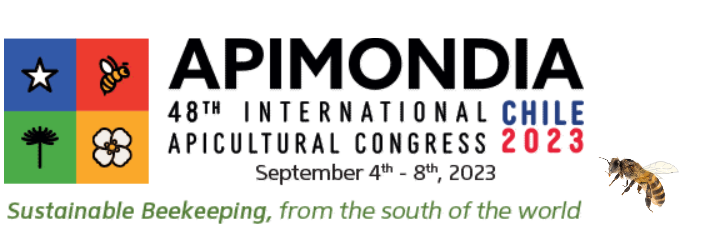
The Russian conference actually was cancelled because of the Russian war against Ukraine. Because the conference is every 2 years, you will have plenty of time to plan for attending. If you are interested in combining a little work with personal travel, Apimondia is a great way to do that.
This is much different than your normal beekeepers associations meetings as the people who go to these conferences have a lot invested in this industry. We post a list of national, state and international beekeeping meetings online so you can find one near you.
Going to Apimondia
Every Apimondia event has its own website dedicated to getting people to the conference.
The event is a very big deal and the organizers do a great job at getting vendors in place and set up as well as giving resources to the people attending. They will help organize hotels, travel, tours, etc…
Each host nation has 2-4 years to plan for the event and take it very seriously. Usualy the conference has events before, during and after the 4 day conference to enhance the visit.
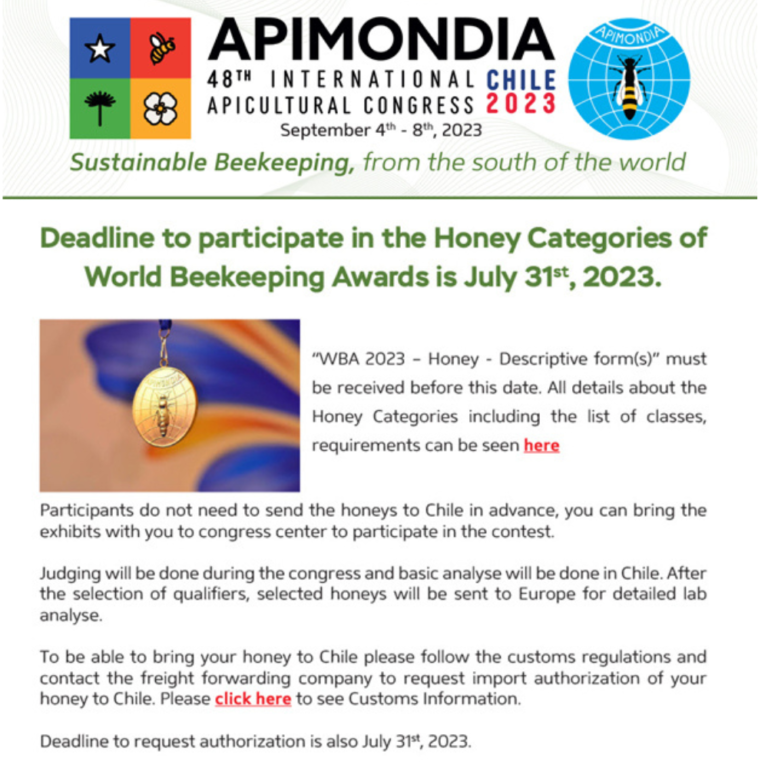
Apimondia Trade Show And Expo
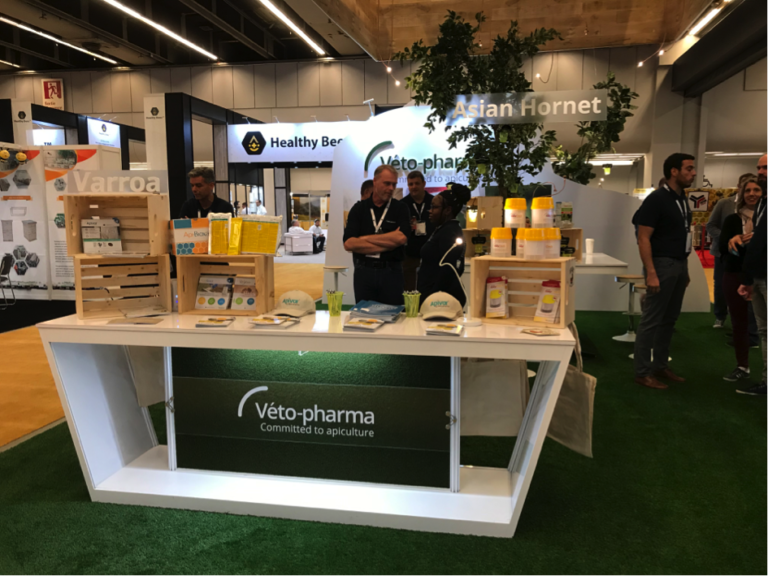
The tradeshow presents the latest advancements in beekeeping equipment, technologies, and products. Vendors from around the world exhibit their innovative solutions, offering insights into everything from hive management tools to sustainable practices.
Asia, Africa, Europe, Australia and North and South America all have vendors at the expo. It’s truly a unique place.
But the expo is more than a marketplace. It’s an opportunity for learning and collaboration, with workshops, live demonstrations, and interactions with industry experts.
Whether you’re seeking new tools or keen to connect with fellow professionals, the trade show and expo provide a tailored experience that reflects how beekeeping is changing.
The expo has products for both backyard and commercial beekeepers. If you like honey bees, you’ll find something at the expo for you. It’s also a great place to make business connections as well. If you are in the supplier side of the industry, it is a great place to make connections and strike deals.
In essence, Apimondia’s trade show and expo are where the beekeeping community comes together to exchange ideas, discover new trends, and foster connections. It’s a not-to-be-missed facet of the conference that resonates with both seasoned experts and newcomers alike.
Speakers and Education
The speaking portion of Apimondia’s conference is thoughtfully organized to cater to the different interests and needs of the beekeeping community.
The schedule is typically filled with an array of talks and demonstrations, covering everything from the most advanced scientific research to hands-on, practical beekeeping techniques.
Speakers range from world-renowned scientists to local beekeeping experts, all sharing their wisdom and insights. The conference is often divided into various tracks or themes, allowing attendees to choose sessions that align with their interests and expertise level.
For instance, one track might focus on sustainability and conservation, while another delves into the art and science of honey production.
One of the more interesting sides of the conference are the quick 15 minute presentations that happen throughout the conference.
It gives students and researches an opportunity to present their findings and a quick way for attendees to consume a lot of different material.
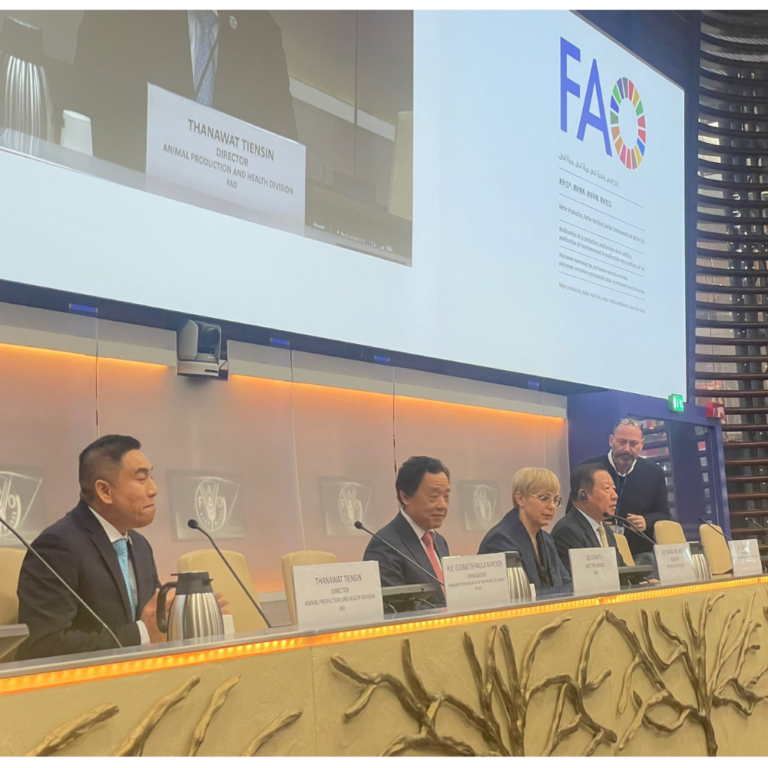
Interactive workshops and Q&A sessions are common, encouraging direct engagement between speakers and attendees. This fosters a more personal and enriching educational experience.
The presentations aim to be accessible and valuable to everyone, whether a novice backyard beekeeper or a professional in the industry.
Beekeeping Tours
Apimondia also organizes technical or tourist tours before, during and after the conference. This gives people coming to the conference the opportunity to see the area in addition to just coming to the conference.
They have something called Technical tours that are a tour of the area that also includes beekeeping. The tour may go and see a honey house, lab or apiary in the area.
Whether it’s a visit to a state-of-the-art bee breeding center or a traditional apiary that has perfected the art of organic beekeeping, the technical tours offer a diverse experience.
They’re not merely observational; participants often have the chance to engage with local beekeepers, researchers, and industry professionals, gaining insights into the methodologies, tools, and best practices being employed.
These tours act as a live extension of the conference, reflecting the themes and subjects discussed in the sessions. They offer a tangible connection to the theoretical knowledge, enabling attendees to see, touch, and understand how concepts are applied in real-world scenarios.
Apimondia Honey Show
The honey show at Apimondia is world class compared to other honey shows. It follows a lot of the same format and categories, but you have to pay for every entry and they will send honey samples off for purity testing. They take it very seriously and the judging is at a whole new level.
These are the details for just the the liquid, creamed and comb honey.
Honey Show Entries:
Jars/containers of honey to be between 225g and 1 kg and filled to the correct level.
No form of identification by means of any label attached to the jar other than a sign or label that can be easily removed or erased which gives the code of the honey used on the form.
The container of the piece of comb must be transparent and airtight.
No form of identification by means of any label attached to the container other than a sign or label that can be easily removed or erased which gives the code of the comb honey used on the form.
Humidity must be under 18 % for all the honey presented
HMF must be under 20 mg/kg for temperate zones and 40 mg/kg for tropical and mediterranean zones
Invertase must be up to 50 UE and up to 25 UE for some monoflorals honey poor in enzymes (tropical honeys and citrus, lavander, tilia, erica arborea, arbustus, …)
Antibiotics must be under a limit which highlights the absence of antibiotic use in the hives and detection limit of the laboratory for ban antibiotics like chloramphenicol or nitrofuran.
Adulteration to check the absence of foreign sugar
Sugar and or Pollen analysis to check whether they meet the specific criteria established for the botanical origin
Conductivity to check the presence of honeydew or a specific botanical origin
Organoleptic test for monofloral honeys to verify their typicality
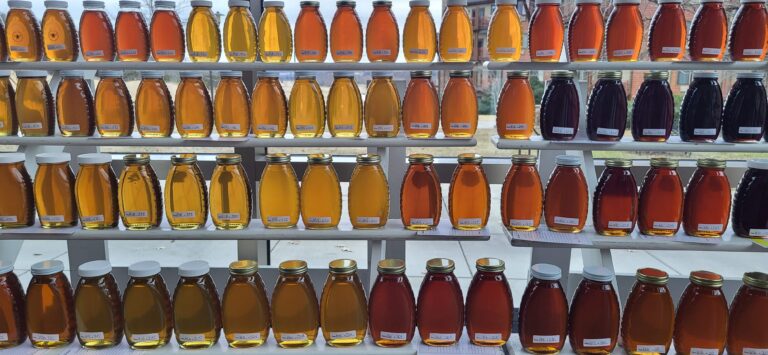
Other Honey Show Entries
Section A. Mead (Entry fee 75 USD per exhibit)
Class 1: Traditional mead.
Class 2: Metheglin – Mead flavored with spices.
Class 3: Fruit mead – Various fruit flavors.
Section B. Beeswax (Entry fee 75 USD per exhibit)
Class 4: Beeswax block.
Class 5: Three plain beeswax candles.
Class 6: Three decorated beeswax candles.
Class 7: Model made from beeswax.
Section C. Displays (Entry fee 100 USD per exhibit)
Class 8: Decorative display of bee products.
Section D. Photographs with a Beekeeping Theme (Entry fee 75 USD per exhibit)
Class 9: Color photograph.
Class 10: Close-up or macro photograph.
Section E. Printed Materials (Entry fee 75 USD per exhibit)
Classes 11-17: Various categories of beekeeping books, journals, albums, posters.
Section F. Innovations/Inventions (Entry fee 75 USD per exhibit)
Class 18: Innovation/Invention with general beekeeping interest.
Class 19: Innovation/Invention with scientific interest.
Section G. Trade Stand Class (Entry fee – free)
Class 20: Small stand.
Class 21: Medium stand.
Class 22: Large stand.
Apimondia Host Cities Since 2000
2001: Durban, South Africa
2003: Ljubljana, Slovenia
2005: Dublin, Ireland
2007: Melbourne, Australia
2009: Montpellier, France
2011: Buenos Aires, Argentina
2013: Kyiv, Ukraine
2015: Daejeon, South Korea
2017: Istanbul, Turkey
2019: Montreal, Canada
2021: Ufa, Russia (cancelled)
2022: Istanbul, Turkey
2024: Santiago, Chile

